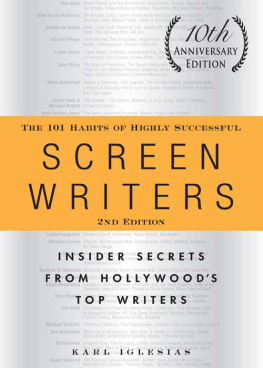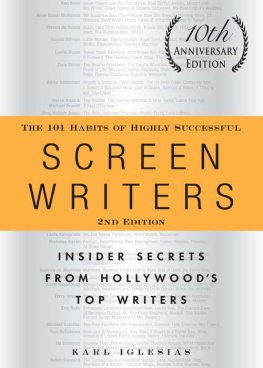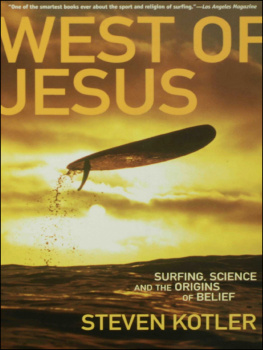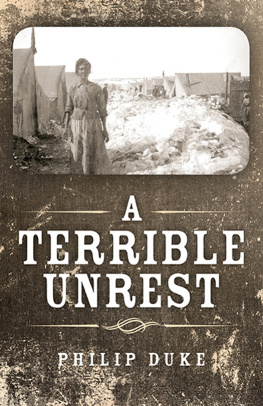HABIT n. 1. a. A recurrent, often unconscious pattern of behavior that is acquired through frequent repetition. b. An established disposition of the mind or character. 2. Customary manner or practice: a person of ascetic habits. 3. An addiction.
INTRODUCTION
FADE IN
We are what we repeatedly do. Excellence, then, is not an act, but a habit.
A RISTOTLE
Despite the old adage attributed to William Goldman, Nobody knows anything, theres one thing every studio executive knows for sure: It all starts with a great script.
But most scripts are terrible, mediocre, by the numbers, or almost good, which means that in order to feed the industrys ravenous appetite, executives are desperately looking for great material.
If you want something youve never had, you have to do something youve never done!
K IMNESHA B ENNS
The problem isnt craft. Its the temperament of aspiring writerstheir traits, skills, talents, and habitsthat keeps them from writing great screenplays. It may sound harsh, but the sad truth is that more than half of the scripts currently making the rounds in Hollywood were written by writers who have no business being screenwriters. Sure, everyone goes to the movies and knows when theyre good or bad, and everyone has access to a computer with which to write their screenplay. But think about this: Everyone can recognize a funny joke, but can everyone create one thats as funny and has never been told before?
Theres a multimillion-dollar business devoted entirely to giving outdated prescriptions, rules, and formulas to aspiring screenwritersin an industry that frowns on formulas. Aspiring screenwriters are willing to pay anything to get that magic key that will open the door to a spec sale that will instantly change their lives. (A spec script is a screenplay written without pay, on speculation that it will sell to a producer or get representation by an agent.)
One hasnt become a writer until one has distilled writing into a habit, and that habit has been forced into an obsession.
N IYI O SUNDARE
In order to write a great script, you have to be a real screenwriter because, like an aged wine, it takes time and hard work to develop the necessary craft to write great scripts. You cant just be a fly-by-night hack, dreaming of the big score.
Winners have simply formed the habit of doing things losers dont like to do.
A LBERT G RAY
The difference between successful screenwriters and unsuccessful screenwriters is that successful screenwriters do all the things that unsuccessful ones want to do but cant do or dont know how to do. Modeling what works is the philosophy at the heart of every masterapprentice craft. Why not screenwriting? Someone is doing it rightmany are, in fact. Why not ask them how they do it? Hey, successful screenwriter dude, what are your habits? What works for you? Enlighten me.
If I wanted to become a tramp, I would seek information and advice from the most successful tramp I could find. If I wanted to become a failure, I would seek advice from people who have never succeeded. If I wanted to succeed in all things, I would look around me for those who are succeeding, and do as they have done.
J OSEPH M ARSHALL W ADE
The focus of this book is not on how to write a formulaic script but on what it takes to become the writer who creates a unique one. In other words, on the habits and traits that increase the odds of your writing a great scriptand also developing a successful career as a screenwriter.
What This Book Is About
The more than one hundred books on the craft of screenwriting attempt to teach the reader what to do, whereas this book outlines, by asking those who are already doing it successfully, how to do it. It focuses on the necessary habits, so that the how becomes second nature to you. Its based on the simple philosophy of modeling excellence and the common sense approach of the apprenticemaster relationship.
This book departs from the established interview books in that its structure is organized by topic rather than by individual interview, following a much more efficient model of reverse engineering. In other words, it focuses on a particular habit, trait, or indispensable skill, and then has a group of highly successful screenwriters share their thoughts on the subject, much like a panel of experts discussing a specific topic.











